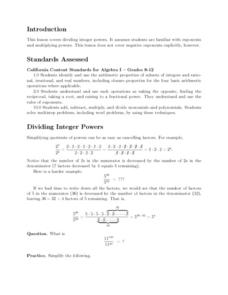Curated OER
The Quest For Power
Students investigate and apply properties of math. In this algebra and physics lesson, students define important vocabulary words to create a basic understanding of keywords. They perform experiments using concepts of electricity and math.
Curated OER
Interactivate - Lines, Rays, Line Segments, and Planes
Students explore lines, rays, line segments, and planes. For this math lesson, students discuss the math concepts and direct their instructor in graphing functions. Students collaborate in graphing additional functions.
Curated OER
Pythagorean Theorem
For this measurement lesson, learners examine the Pythagorean Theorem, perimeter, and areas of right triangles. They record their measurements and research their findings on a grid.
Curated OER
Tessellations: Geometry and Symmetry
Learners explore the concept of tessellations. In this tessellations instructional activity, students use an applet to construct tessellations. Learners use regular polygons to construct tessellations. Students find patterns and symmetry...
Curated OER
Pascal's Triangle
Students explore the concept of Pascal's Triangle. For this Pascal's Triangle lesson, students use an applet called 'Coloring Multiples' to explore Pascal's Triangle. Students develop patterns starting with various numbers in Pascal's...
Curated OER
Dividing Integer Powers
Work on the concept of using division with integer powers. The skills of using exponents and multiplying powers should be in place before attempting this instructional activity. The instructional activity provides examples for the...
Curated OER
Numbers, Numbers Everywhere!
Explore properties of integers! In this algebra lesson, pupils add, subtract, divide and multiply using integers correctly. They differentiate between rational and irrational numbers.
Curated OER
Length, Perimeter, and Area
Young scholars explore the concepts of length, perimeter, and area. In this math instructional activity, students use Shape Explorer to practice finding length, perimeter, and area.
Shodor Education Foundation
Surface Area of Rectangular Prism
With this interactive activity, learners compute the surface area of rectangular prisms. They visit an online investigation applet and record data on the provided handout. Pair this activity with the volume activity by the same publisher...
Shodor Education Foundation
Volume of Prisms
Explore the concept of volume of prisms using an applet to perform the calculations. The link to the interactive applet is embedded into the lesson plan as well as a link to associated data sheets. Get your math class to the computer lab...
Curated OER
Discovering Ohm's Law
Connect math with science! Pupils apply properties of Ohms Law as they solve problems and identify the inverse relationship of a function. They analyze the shape of the graph of an inverse function and use it to make predictions.
Curated OER
Probability and Applications of Simulations
Middle schoolers apply properties of probability to the real world. In this probability instructional activity, learners simulate the construction of empirical distribution. They collect and analyze data using central tendencies.
Virginia Department of Education
Scientifically Speaking
Explore the connection between operations with scientific notation and the laws of exponents. Scholars work on a set of word problems involving operations with scientific notation. Along the way, they consider how the laws of exponents...
Curated OER
Rewriting Equations &Formulas
Practice with literal equations. Solve for one variable in terms of another. Find the value of y given specific values of x. This short instructional activity would make a good warm-up activity at the beginning of class or a quick...
Curated OER
Solving Equations
For this Algebra II worksheet, 11th graders use the properties of equality to solve multi-step equations in one variable. The tow page worksheet contains explanation, guided examples, and fifteen practice problems. Answers are not...
Alabama Learning Exchange
"Like Terms", I Add Them
Ninth graders add and subtract polynomials. In this Algebra I lesson plan, 9th graders work practice problems as they view a PowerPoint presentation of the lesson plan. Both the horizontal and vertical methods of addition and...
EngageNY
A Surprising Boost from Geometry
Working with imaginary numbers — this is where it gets complex! After exploring the graph of complex numbers, learners simplify them using addition, subtraction, and multiplication.
EngageNY
The Graph of the Natural Logarithm Function
If two is company and three's a crowd, then what's e? Scholars observe how changes in the base affect the graph of a logarithmic function. They then graph the natural logarithm function and learn that all logarithmic functions can be...
EngageNY
Choosing a Model
There's a function for that! Scholars examine real-world situations to determine which type of function would best model the data in the 23rd installment of a 35-part module. It involves considering the nature of the data in addition to...
EngageNY
Proving Trigonometric Identities
Young mathematicians first learn the basics of proving trigonometric identities. They then practice this skill on several examples.
EngageNY
Bean Counting
Why do I have to do bean counting if I'm not going to become an accountant? The 24th installment of a 35-part module has the class conducting experiments using beans to collect data. Learners use exponential functions to model this...
EngageNY
Graphing Factored Polynomials
Young mathematicians graph polynomials using the factored form. As they apply all positive leading coefficients, pupils demonstrate the relationship between the factors and the zeros of the graph.
Curated OER
Adding and Subtracting Polynomials
For use with a TI-nspire calculator, this lesson focuses on adding and subtracting polynomials. Learners use calculator to add and subtract polynomials using both the vertical method horizontal methods. A class discussion follows the...
Curated OER
Exploring Expressions
Examine parts of an expression in this algebra instructional activity. Ninth graders identify the properties of the coefficient and their behavior to the graph. They graph the equation on a TI to see their results.

























